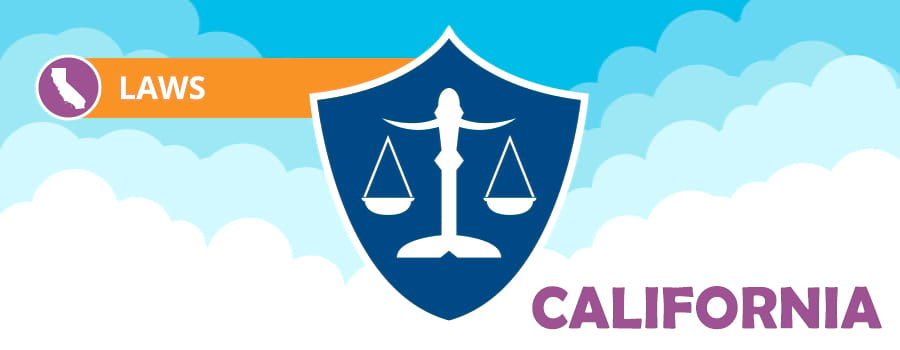California Homeschool Laws
In the past, rumors have circulated that homeschooling in California is illegal. That is not true. It is an established right of parents in the state. But there are laws that parents must follow. Children are obligated to attend full-time public school or continuation school unless they are exempted. A full-time private school is considered an exemption, and many parents choose this path to home education by forming a private school in their own home or enrolling in a private school satellite program or charter school. If you’re considering taking responsibility for your own child’s education, you’ll need to know what are the requirements for homeschooling in CA.
- 5 Ways to Legally Homeschool in CA
- Establishing a Home-Based Private School in CA
- Homeschool Record Keeping in CA
- Homeschool Graduation Requirements in California
- Going Back to Public School
- Additional Resources Related to Homeschooling in California
*This should by no means be interpreted as legal advice. It is your responsibility to interpret and understand the laws and rules that you will be homeschooling under.
5 Ways to Legally Homeschool in CA
The California education code never mentions homeschooling, but parents have the legal right to homeschool as long as they choose one of these five ways:
- Establish a private school in their own home.
- Enroll their children in a private school that offers a satellite program (PSP).
- Hire a private tutor or hold a California teaching credential themselves.
- Send their children to a public school that offers independent study.
- Enroll their children in a public charter school.
The guidance on this page will be primarily focused on option one above, but that certainly doesn’t mean it is any more valid or preferable than any of the other options. Rather, establishment of a private homeschool is simply the traditional homeschooling option that many parents are most curious about. You can find more information on options two, four, and five on our California Homeschool Charter Schools page.
Homeschooling in California Requirements
No matter which of the above methods you ultimately choose to use for homeschooling in CA, there are some general requirements to keep in mind.
- Children ages 6 and up must be enrolled in a legal school.
- Home-based private schools must file a Private School Affidavit to begin homeschooling.
- Parents who file the private school affidavit must provide all curricular, instructional, and other materials.
- Private school teachers must be “persons capable of teaching”.
More information relating to the home education rules for California can be found at A2ZHomeschooling.com.
Full Details of California’s Homeschool Laws
Establishing a Home-Based Private School in California
Homeschooling parents can establish a private school based in their home by filing a California homeschool affidavit. The Private School Affidavit (PSA) can be filed with the California Department of Education (CDE) on their website from October 1 to October 15. It must be filed every year that you plan to continue homeschooling as a private school entity.
Although this sounds technical, don’t let the language overwhelm you. You will need to create a name for your homeschool and keep specific items on file about it, but once established, private school homeschools in California have an exceptional amount of freedom. There are no reporting requirements regarding your child’s curriculum or grades, no annual testing, and you have complete autonomy to choose the best homeschool curriculum to meet your child’s specific learning needs.
Homeschool Record Keeping in CA
Education law for private schools in California designates that each must maintain the following records in their files:
- A copy of their completed Private School Affidavit (PSA)
- Attendance records, which can be as simple as a marked calendar
- Courses of study offered in your homeschool
- Faculty addresses and qualifications, which is left up to the homeschooling parents whether or not they are capable of teaching their own children
- Immunization Records or Waivers
Even though this is the minimum required by CA law for your homeschool, that does not mean that you can’t keep more detailed records. In fact, there will likely be situations in the future that will be benefited by a strong overview of your homeschool progress. If your student returns to traditional schooling, for example, the administrators and teachers may request information on the scope of your homeschool curriculum. Also, keeping accurate records comes in extremely handy when it is time to prepare your homeschooled high schooler’s transcript.
Time4Learning’s parent-friendly program makes homeschool organization a breeze. Our automated system grades lessons, tracks progress, and keeps reports for homeschool portfolio usage. Reports can be accessed at any time through the Parent Administration page and can be pulled by date or subject.
Homeschool Graduation Requirements in California
Unless you are beginning your homeschool journey in high school, graduation may seem a long way off. But it never hurts to be prepared. The primary thing to know is that the path to homeschool graduation isn’t usually parallel to the one traditional students follow. That’s because homeschooling families have much more flexibility in deciding their own graduation requirements.
Depending on how you’ve set up your homeschool in California–PSP or private home-based school–the graduation requirements can vary, though. The comparisons below are focused on home-based private schools. If you are enrolled in a PSP, please consult your individual school for graduation requirements.
| Public/Private School | Homeschool | |
|---|---|---|
| California diploma requirements | Most school districts in California require between 22 and 26 one-year courses (or the equivalent) for graduation. | Parents homeschooling under the private home study option determine when their student has fulfilled graduation requirements and can issue their own homeschool diploma. |
| California high school testing requirements | California does not require exit exams for graduating seniors. | Homeschool students are not subject to testing requirements for graduation. |
| California high school transcripts | Transcripts from CA public schools include a list of all units of study by year, along with grades and credits received in each; also included is a cumulative grade point average (GPA) for the high school career; any standardized testing scores received during high school will also be noted on the transcript. | Homeschool parents may create their own student transcripts, and may include any information they deem pertinent to colleges, military, and/or future workplace organizations. |
| California high school course credits | Minimum course requirements in CA include 3 courses of English; 2 mathematics courses (including Algebra I); 2 courses in science (including biology and physical science), 3 courses in social studies, including United States history and geography; world history, culture, and geography; a one-semester course in American government and civics, and a one-semester course in economics; 1 course in visual or performing arts, foreign language, or career/technical education. Local school boards may also define additional credit requirements in California. | Parents determine when their student has fulfilled graduation requirements; for the purpose of creating transcripts, some homeschool parents do assign credits to individual courses. |
| GED eligibility | In CA, there are a few alternatives to a high school diploma: the GED®, the HiSET®, and taking the California High School Proficiency Exam. | The same requirements for eligibility apply to homeschoolers as to public school students. |
Going Back to Public School
Most families take their homeschool adventure on a year-by-year basis. If it’s continuing to work well for them, terrific. If not, they may make the decision to give school another try. Enrolling in public school after homeschooling is a common transition. As long as you have kept a thorough homeschool portfolio of what your student has accomplished while homeschooling, any school should have no problem determining what grade level to place your student in. Some schools may require additional assessment testing or evaluations at the time of enrollment, though. It is also possible that, at the high school level, a school may not accept the credits a student has achieved while homeschooling. This shouldn’t cause you undue stress, however. When submitting transcripts to your potential colleges, your student can simply share both the transcript from the public school and the homeschool transcript showing coursework completed while learning at home.
Additional Resources Related to Homeschooling California
Have other questions about homeschooling in California? You may find the following pages helpful.
- Homeschooling in California
- Homeschool Charter Schools in California
- California Homeschool Associations
- California Homeschool Groups and Co-ops
- Homeschool Field Trips in California
- California Test Prep
Welcome to Homeschooling Guide
Download this FREE resource where experienced homeschoolers share their stories for how to begin homeschooling, understanding your child academically, planning your days, and much more.







